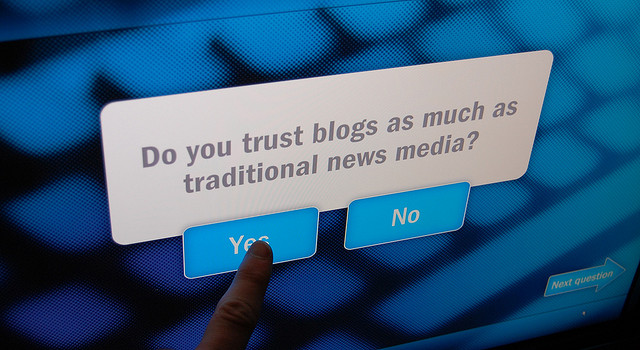By Kerry Gorgone, {grow} Contributing Columnist
The best blogging makes a statement, but if that statement is negative in nature, the blogger might get sued for defamation (making an untrue statement—written or verbal—that tends to damage someone’s reputation).
Large companies in particular tend to have deep pockets, and will vigorously defend their brand against any online attack.
Historically, brands have argued that bloggers should not receive the same First Amendment protections as members of the institutional press, but the 9th U.S. Circuit Court of Appeals recently ruled that they should in the case of Obsidian Finance Group vs. Cox.
The court acknowledged that the question raised “involves the intersection between Sullivan and Gertz, an area not yet fully explored by this Circuit, in the context of a medium of publication—the Internet—entirely unknown at the time of those decisions.”
In order to win a suit for defamation, a public figure must prove “actual malice.” Even in a private defamation case, if the matter is one of “public concern,” the plaintiff must prove that the defendant acted negligently. In either instance, if bloggers were held to these same standards, they’d be protected if they were reasonable in believing their damaging statements to be true.
Courts have been saying since blogging started to become popular that deciding who does and does not qualify as a journalist is complicated and impractical. The court in Cox went even further, stating that “a First Amendment distinction between the institutional press and other speakers is unworkable.” As blogging becomes easier and more people (and brands) begin using the medium, drawing a distinction is likely to become even less “workable.” After all, as Michael Brito has said, all companies are now media companies.
3 Tips for Defamation-Free Blogging
If you’re tempted to make a negative statement—especially about a company—think carefully.
- First, is the statement purely opinion? Opinions are generally protected. For example, saying “McDonald’s fries taste gross” would be an opinion. By contrast, saying “McDonald’s fries contain furniture polish” is phrased as a statement of fact, and is potentially very damaging to the franchise.
- Second, if what you’re saying goes beyond opinion, can you prove that it’s true? The defendant in a defamation case doesn’t have to prove the truth of the statement in the United States (although this is how defamation cases work in the United Kingdom). Nonetheless, going through the exercise of proving to yourself that the statement is true will help you to decide whether you feel confident publishing it, and also makes it less likely that you would lose if you are sued over the statement.
- Third, even if the statement is true, are you willing to spend money on attorneys’ fees and court costs in the event of a lawsuit? You might be convinced the statement is true, but a court might disagree. Even if the court does rule in your favor, it will likely be after months of expensive litigation. Most bloggers don’t earn much money directly from blogging (more than 80% of bloggers never make $100 from blogging), so you should carefully consider whether the statement you want to make is worth the risk.
 Kerry O’Shea Gorgone is a writer, lawyer, speaker and educator. She’s also Instructional Design Manager, Enterprise Training, at MarketingProfs. Kerry hosts the weekly Marketing Smarts podcast. Find Kerry on Google+ and Twitter.
Kerry O’Shea Gorgone is a writer, lawyer, speaker and educator. She’s also Instructional Design Manager, Enterprise Training, at MarketingProfs. Kerry hosts the weekly Marketing Smarts podcast. Find Kerry on Google+ and Twitter.
Top Photo Credit: Rogers Cadenhead via Flickr cc



